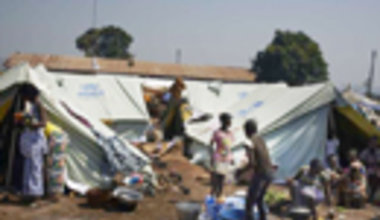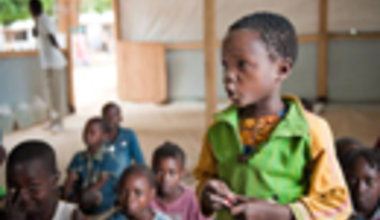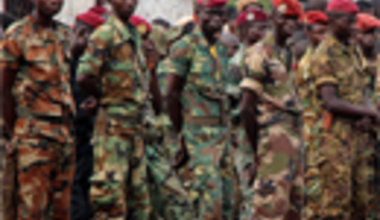More must be done to aid those uprooted in Central African Republic conflict, UN warns
24 December 2013 – The United Nations voiced increasing concern today for the security of 710,000 people uprooted by conflict in the Central African Republic (CAR) amid difficulty of access to the sites where they have sought shelter and reports of youths prowling around with grenades and machetes.
“Some 60 per cent of the displaced population are children, more needs to be done in terms of assistance and protection,” Lasare Kouassi Etien, the representative of the UN High Commissioner for Refugees (UNHCR), said in Bangui, the capital, where 214,000 people have fled their homes as the year-long violence has taken on increasingly religious overtones, with Christians seeking refuge in schools, churches and at the airport while some 35,000 Muslims are living with host families.
“We have serious concerns over the prevailing humanitarian and security conditions in IDP [internally displaced persons] sites and in host families.”
The impoverished country has been thrown into turmoil since mainly Muslim Séléka rebels launched attacks a year ago and forced President François Bozizé to flee in March. A transitional government has since been entrusted with restoring peace and paving the way for democratic elections. The mainly Christian anti-Balaka movement has taken up arms and inter-communal clashes erupted in Bangui for the first time earlier this month.
The Archbishop and the Imam of Bangui have teamed up in an effort to defuse the tensions with reconciliation campaigns in IDP sites and across the city but security and access remain top concerns, especially at Bangui airport.
“There is a complete disorder in this site. Young people are carrying grenades and machetes,” Imam Kobin Omar Yalama said.
“The tension is high,” Archbishop Dieudonné Nzapalainga added. “I attempted to meet IDPs on this site without success.”
Mr. Etien stressed: "We are working with all counterparts to ensure that the civilian character of all IDP sites is observed to allow secure access to the IDPs and to ensure their safety."
Adelaide, a woman in her 60s, is among 17,000 people who have sought refuge in recent weeks at the Archbishopric compound in Bangui, according to UNHCR. Carrying a bag with her belongings, she walked for two hours and could barely stand when she arrived last Saturday.
“I saw armed people, people I have never seen before at Kasai [on the city’s eastern outskirts],” she said, wiping away tears mixed with sweat rolling down her cheeks. “When I heard gunshots, I decided to join the neighbours who were fleeing. On my way, I saw at least 15 dead people on the street.”
Living conditions in other IDP sites are inadequate. “We are more than 20 people in a single tent and others sleep outside in the open air,” said Grace, holding her baby. “Those who sleep in churches have to evacuate them at 4 am to allow for preparation of the morning mass. Children fall sick because of the morning cold.” UNHCR’s health partner, the International Medical Corps, has established health posts at the IDP sites.
Between 200 and 250 IDPs are treated daily by nurses in the Archbishopric compound, most of them suffering from malaria and diarrhoeal diseases.
Under the inter-agency response to this crisis, UNHCR is leading the protection, shelter and non-food items clusters. It has so far deployed an emergency team of 10 people to Bangui. An airlift operation is scheduled to bring in relief items by the end of the year to replenish supplies.
In addition to the massive internal displacement, the conflict has also driven Central Africans to flee to neighbouring countries. Since March, about 43,500 people have crossed into the Democratic Republic of the Congo (DRC), 12,000 into Chad, 11,000 into the Republic of Congo, and 5,000 into Cameroon.
Source: UN News Centre
 UN
UN





